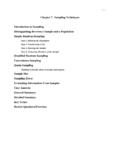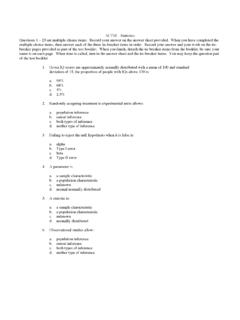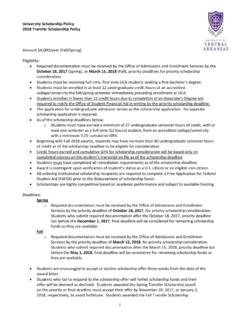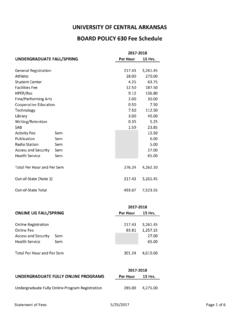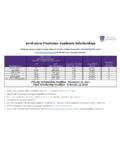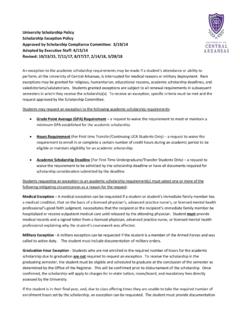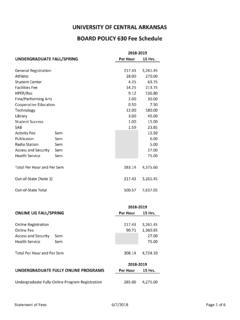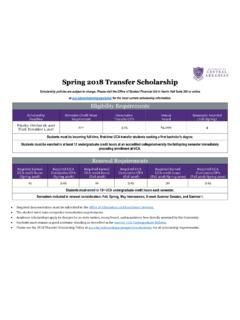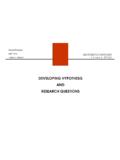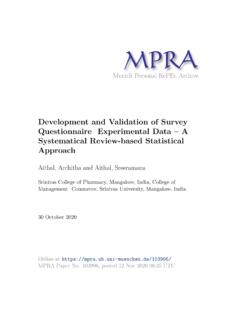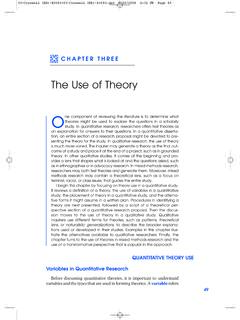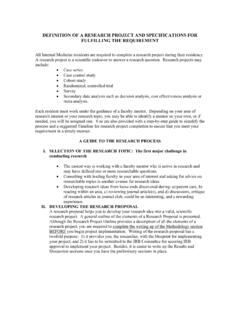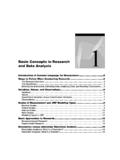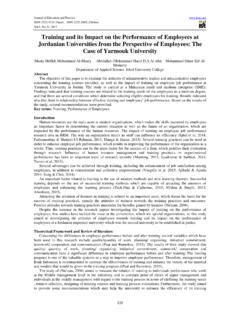Transcription of Chapter 4 Developing Research Questions: Hypotheses …
1 4-1. Chapter 4. Developing Research Questions: Hypotheses and Variables Common Sources of Research Questions Professors Textbooks Databases Internet Selecting a Research Problem Formulating Hypotheses Variables of Interest Selecting Levels of an Independent Variable Selecting a Dependent Variable Characteristics of a Good Dependent Variable Multiple Dependent Variables Response Classes of Dependent Variables Case Analysis General Summary Detailed Summary Key Terms Review Questions/Exercises 4-2. Common Sources of Research Questions The first three chapters introduced you to some broad themes in behavioral Research , including the purpose of Research , types of Research , ethical issues, and the nature of science. Beginning with this Chapter , we will focus on the details of conducting behavioral Research . From a student's perspective, the thought of actually doing behavioral Research seems like a daunting task.
2 You are likely to say to yourself, I couldn't possibly do Research . I'm not a behavioral scientist. I don't even know how to get started.. Well, we're here to tell you that you can do it, and it is not that difficult to get started. Have you ever asked yourself, I wonder why people behave that way? If so, then you have already begun the Research process. Research begins with asking questions. Curiosity about a casual observation that you have made could initiate a series of questions. For example, you may notice that youth spend much time watching television and that many of the television programs include references to sex and/or violence. So you may ask yourself, Does watching television violence have a negative impact on personality development? This is the beginning of a good Research question . Topics for Research questions often begin with your own curiosity.
3 This curiosity may be fueled by your own personal experiences or observations. You may be interested in the topic of memory because you had a grandmother with Alzheimer's disease. You may be interested in people's perceptions of schizophrenics after taking a course in abnormal psychology. Perhaps the latest reality show on television stirs questions about why people behave in certain ways when placed in certain conditions. Research is so much more fun when you are pursuing a topic that fascinates you. For most topics, it is very likely that others have already asked very similar questions and have conducted Research in this area. But a good researcher knows that unanswered questions remain in every domain of psychology. So, given an area in which you are interested, what is the next step? A researcher needs to become familiar with the Research findings that already exist.
4 These findings are most likely to be reported in books and journal articles. Several strategies for obtaining this information are outlined in the following paragraphs. Professors Ask the faculty in the psychology department whether they have any information regarding your Research question or whether they know of anyone doing Research on the topic (this is also a good way to meet the faculty). Often, the Research interests of the faculty are listed on a department Web site. Most faculty that we know enjoy discussing possible Research topics with students and will often provide suggestions that help to shape and focus the topic. If the topic is of interest to the faculty member, he or she may suggest that you take an independent study course under his or her supervision. 4-3. You should also consider professors at other universities. You may encounter these researchers at a scientific conference where you attend their Research presentation.
5 Additionally, a search of the literature may reveal a particular researcher who has published several studies related to the topic in which you are interested. You could contact the researcher by e-mail to request a reprint of an article or to ask a few questions. Textbooks Look in the subject index of a textbook in your area of interest. The text will often include the names of researchers and citations of books or articles. For example, look in a Developmental Psychology textbook for television. You will undoubtedly find a section that discusses the impact of television on development. Databases Use keywords to search relevant databases. Several very good electronic databases contain references to journal articles or books. Ask your instructor or a reference librarian for the databases available on your campus. Some databases that are useful for behavioral Research include PsycLit, PsycINFO, ProQuest, JSTOR Scholarly Journals, MedLine, and Sociological Abstracts.
6 After you get access to a database, you can search it for references. You can search by author, year, or other means. Often, you will simply search for some word (or combination of words) that might appear in the title or summary. For example, you could use the PsycINFO database to search journal articles for studies related to the effect of TV violence on children. We did such a search. When we used the keyword television, the database produced 6,671. hits. No one wants to look through this many titles or abstracts, so we narrowed the search by using the keywords television violence. This search produced 156 hits, and it would not take too long to skim through those titles. A final search using the keywords television children produced a very manageable 17 hits. Thus, if the database finds too many articles for you to examine, narrow the search by entering additional keywords or by trying different combinations of keywords.
7 Internet The Internet can be a source of Research ideas. However, it takes some skill to search the Internet efficiently. First, much of the information on the Internet has no relation to science, and it can be very difficult to search a topic without hitting these sites. Second, some of the information on the Internet appears to be scientific when it is not. You must critically evaluate each site. For example, is the site located at a university or a known Research agency? What are the credentials of the researcher(s)? Are there product advertisements at the site? Also, certain Internet search engines are more focused on 4-4. scholarly information. As of this writing, two useful search engines are Ingenta, Galaxy and Google Scholar. Selecting a Research Problem Scientists select a Research problem for any of several reasons. Some studies are undertaken to evaluate or to advance a particular theory.
8 Others may be undertaken for the purpose of comparing the adequacy of two or more theories. The researcher's interest may have nothing to do with solving an existing psychological or sociological problem. As discussed in the previous Chapter , terms such as pure or basic Research are often used to describe Research when no immediate practical application of the results is intended. In contrast, some Research is undertaken because of its applied, practical nature. A social problem exists, and questions related to the problem are in need of answering. Is smoking marijuana a health hazard? Will certain changes in our educational system enhance scores on the American College Test or Student Achievement Test? Others undertake studies to resolve inconsistencies or contradictory findings. If some Research indicated that sleep following learning aids memory (which it does) and other Research found that sleep hinders memory (which it doesn't), then the findings would be contradictory.
9 If so, then little could be said regarding sleep and memory without additional Research . The additional Research would be directed to resolving the inconsistent findings. It would begin with a careful assessment of the two studies to determine in what ways they were similar and in what ways they were different. If important differences in procedure were found between the studies, then the contradictory findings might be due to these differences. In this case, a study could be undertaken to determine whether procedural differences were important. Some Research is conducted to extend the findings of prior Research . For example, a study may show a particular effect of TV violence on 10-year-old children. You might ask whether that same effect would be observed in 5-year-old children. Also, you might be interested in extending the conditions that were tested.
10 Perhaps you are interested in testing a type of TV violence that was not tested in another study. At other times, the findings of a particular study may seem implausible. In cases such as these, it is valuable to perform a replication study. In such a study, the method is replicated (duplicated) to determine whether the same results will be found a second time. Obviously, Research questions may be asked for many reasons. Answers to all questions cannot be provided, nor should they be. Clearly, some questions are too trivial and meaningless to bother answering. 4-5. Formulating Hypotheses After you have reviewed the relevant literature and have a Research question , you are prepared to be more specific. You want to make one or more predictions for your study. Such a prediction is called a hypothesis. It is an educated guess regarding what should happen in a particular situation under certain conditions.
